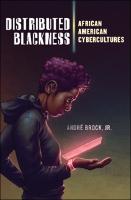Distributed Blackness
African American Cybercultures
Abstract
Winner, 2021 Harry Shaw and Katrina Hazzard-Donald Award for Outstanding Work in African-American Popular Culture Studies, given by the Popular Culture Association Winner, 2021 Nancy Baym Annual Book Award, given by the Association of Internet Researchers An explanation of the digital practices of the black Internet From BlackPlanet to #BlackGirlMagic, Distributed Blackness places blackness at the very center of internet culture. André Brock Jr. claims issues of race and ethnicity as inextricable from and formative of contemporary digital culture in the United States. Distributed Blackness analyzes a host of platforms and practices (from Black Twitter to Instagram, YouTube, and app development) to trace how digital media have reconfigured the meanings and performances of African American identity. Brock moves beyond widely circulated deficit models of respectability, bringing together discourse analysis with a close reading of technological interfaces to develop nuanced arguments about how “blackness” gets worked out in various technological domains. As Brock demonstrates, there’s nothing niche or subcultural about expressions of blackness on social media: internet use and practice now set the terms for what constitutes normative participation. Drawing on critical race theory, linguistics, rhetoric, information studies, and science and technology studies, Brock tabs between black-dominated technologies, websites, and social media to build a set of black beliefs about technology. In explaining black relationships with and alongside technology, Brock centers the unique joy and sense of community in being black online now.
Keywords
appropriate technology use; Black culture; Black cyberculture; Black digital practice; Black discursive identity; Black identity; Black kairos; Black memetic subculture; Black online identity; Black pathos; Black respectability politics; Black technocultural matrix; black technoculture; Black Twitter; call-out culture; colored people time; critical discourse analysis; critical race theory; critical technocultural discourse analysis; ctda; digital practice; discourse analysis; dogmatic digital practice; double consciousness; information studies; interiority; internet studies; intersectionality; invention; libidinal economy; Man Crush Monday; memes; mobile phones; modernity; networked counterpublics; online community; online identity; post-present; race and the digital; racial battle fatigue; racial enactment; racial formation; ratchet digital practice; reflexive digital practice; respectability as hygiene; rhetorical frame; satellite counterpublic; science and technology studies; social network; sociality; technoculture; weak tie racism; Western technoculture; Woman Crush WednesdayDOI
10.18574/nyu/9781479820375.001.0001ISBN
9781479811908, 9781479820375, 9781479811908, 9781479811908Publisher
New York University PressPublication date and place
New York, 2020Imprint
NYU PressSeries
Critical Cultural Communication, 9Classification
Ethnic studies
Media studies


 Download
Download Download
Download